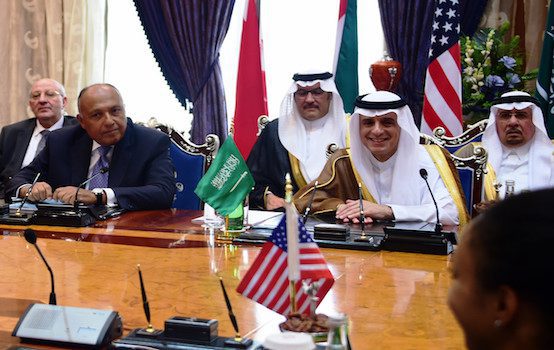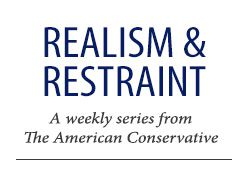Peace Yes, But Please Don’t Whitewash UAE Dictatorship

Israel’s Benjamin Netanyahu, under legal and political siege, celebrated his government’s agreement with the United Arab Emirates to normalize relations. Egypt and Jordan already had done so, but the resulting peace has been cold. UAE, an oil-rich opponent of Iran, has more potential as a partner. Indeed, the latest agreement “was only made possible due to their shared sense of threat from Iran,” noted Trita Parsi of the Quincy Institute.
Netanyahu also was pleased because Abu Dhabi abandoned anything other than pretense of concern for the millions of Palestinians under Israeli occupation. As part of the agreement Israel agreed to forgo—for now, anyway—unilateral annexation of West Bank territory, but Israel’s de facto colonization of Palestinian lands, ratified by the Trump administration, will otherwise proceed unimpeded.
Only when Netanyahu described the Emirates as an “advanced democracy” did he come under significant political fire. That label was errant nonsense. Although improving relations between Israel and any Arab state should help moderate regional conflict, attempting to whitewash his government’s new partner, a repressive, militaristic dictatorship, was fake news at best.
Nor was Abu Dhabi acting out of eleemosynary motives: the Emiratis are expecting a generous F-35 sale by Washington in return. Mutual recognition between Israel and the Emirates is a bit like détente between the U.S. and Soviet Union—good policy, but a deal with the devil.
The Trump administration’s purposes are also politically selfish. An election impends, and the president hopes to squeeze evangelicals for more votes by putting Israeli interests first. Moreover, he wants another big weapons sale: “They have the money and they would like to order quite a few F-35s,” he explained. Rewarding munitions makers may be the only objective more important to Trump than satisfying Israel supporters.
Absolute monarchy is a way of governance more befitting the 15th than 20th century and has disappeared from much of the Middle East. However, the UAE has survived. Its flood of oil dollars provides cash to buy peace, both through abundant security personnel and extensive social subsidies.
Freedom House rates the seven-member United Arab Emirates as not free. Explained the group: “Limited elections are held for a federal advisory body, but political parties are banned, and all executive, legislative, and judicial authority ultimately rests with the seven hereditary rulers. The civil liberties of both citizens and noncitizens, who make up an overwhelming majority of the population, are subject to significant restrictions.”
The UAE does practice a bit of cultural openness and tolerance—certainly more than Saudi Arabia. “Talking about tolerance, diversity and coexistence is important in a region that has generally not become more tolerant in the last 100 years,” wrote the Jerusalem Post’s Seth J. Frantzman.
Nevertheless, the Emirates remain ruthlessly oppressive domestically and dangerously aggressive internationally. Expatriate labor, especially domestic servants, often is mistreated. The UAE’s broad assault on individual liberty also results in foreign victims, some of whom mistakenly expect commercial fairness.
More broadly, the State Department reported:
“Significant human rights issues included allegations of torture in detention; arbitrary arrest and detention, including incommunicado detention, by government agents; political prisoners; government interference with privacy rights; undue restrictions on free expression and the press, including criminalization of libel, censorship, and internet site blocking; substantial interference with the rights of peaceful assembly and freedom of association; the inability of citizens to choose their government in free and fair elections; and criminalization of same sex sexual activity, although no cases were publicly reported during the year.”
Human Rights Watch also was critical:
“Despite declaring 2019 the ‘Year of Tolerance,’ United Arab Emirates rulers showed no tolerance for any manner of peaceful dissent. Ahmed Mansoor, an award-winning human rights activist sentenced to 10-years in prison solely for exercising his right to free expression, went on hunger strike to protest his prison conditions and unjust conviction. Activists who had completed their sentences as long as three years ago continued to be detained without a clear legal basis.”
Mansoor was not the only victim named by HRW. He was arrested for allegedly publishing “False information that harms national unity.” Nasser bin-Ghaith is serving ten years for criticizing the UAE and Egyptian governments. In a case which received international attention British academic Matthew Hedges was arrested, convicted on dubious espionage charges, and then, under foreign pressure, released.
Equally serious is the UAE’s aggressive foreign policy, highlighted by multiple war crimes in Yemen. The Emirates has been called “Little Sparta,” but in truth that is no compliment. Sparta was a totalitarian military dictatorship which brutally ruled over the subject Helot population.
UAE promoted bloody civil war in both Syria, where Abu Dhabi funded radical Islamist forces, and Libya. The Emirates plotted with Riyadh to isolate and then invade Qatar, apparently stepping back from the military brink only because of U.S. pressure and Turkish deployment of troops. Alas, warned Jason Pack of the group Libya-Analysis: “Despite being hailed as a ‘peace deal,’ the UAE-Israel agreement will more likely prolong ongoing regional wars. It will intensify conflict in those contested zones of the Middle East where the two blocs back rival actors—primarily Yemen, Libya, and Syria.”
Worst has been the Emirati and Saudi aggression against Yemen. The war was originally initiated to put pliant puppet President Abdrabbuh Mansur Hadi back in office after he was ousted in one of endless rounds of domestic political unrest that has characterized Yemen’s six-decade existence. However, over the last couple years Abu Dhabi began backing separatists against Hadi, threatening to split a country that originally began as two warring nations. Suspicion is widespread that Abu Dhabi hopes to grab effective control of ports and other commercial facilities.
The result has been humanitarian carnage in what already was one of the world’s poorest nations. Although the Yemeni Houthis have committed their share of war crimes, the vast majority of abuses were caused by the coalition. Indeed, the bombing campaign, backed by the U.S., often appeared to target civilians.
A UN Group of Experts’ report from 2018 concluded: “Coalition air strikes have caused most of the documented civilian casualties. In the past three years, such air strikes have hit residential areas, markets, funerals, weddings, detention facilities, civilian boats and even medical facilities.” Also wrecked was the country’s commercial infrastructure.
Moreover, UAE incarcerated and abused Yemeni opponents. Reported the experts’ panel in 2018: “The Group has reasonable grounds to believe that the Governments of Yemen, the United Arab Emirates and Saudi Arabia are responsible for human rights violations, including enforced disappearance. As most of these violations appear to be conflict related, they may amount to the following war crimes: rape, degrading and cruel treatment, torture and outrages upon personal dignity.”
Around the same time Amnesty International cited a UAE secret prison in supposedly “liberated” territory: The Emiratis practiced “detention at gunpoint, torture with electric shocks, waterboarding, hanging from the ceiling, sexual humiliation, prolonged solitary confinement, squalid conditions, inadequate food and water.”
Although the obviously embarrassed State Department could only bring itself to cite “allegations” of misconduct, its indictment was sharp: “The United Nations, human rights groups, and others alleged UAE military operations as part of the Saudi-led Coalition in Yemen killed civilians, damaged civilian infrastructure, and obstructed delivery of humanitarian aid. Human rights groups alleged UAE-backed security forces in Yemen committed torture, sexual assault, and mistreatment against detainees.”
The Emirates also directly undermines American security interests. Shortly after the “splendid little war” went bad, Abu Dhabi and Riyadh turned to al-Qaeda in the Arabian Peninsula, long viewed as the terrorist group’s most effective national offshoot. Reported the Wall Street Journal, this put the coalition “on the same side as one of the world’s most notorious extremist groups.” In contrast, Yemeni’s Houthi movement had been a determined opponent of AQAP. Two years later Associated Press reported that: “al-Qaeda has emerged as a de facto ally of the government of President Abdrabbuh Mansour Hadi and his backers Saudi Arabia and United Arab Emirates.”
The coalition even transferred U.S.-provided weapons to AQAP and other radical groups. According to Amnesty International: “The UAE for instance, even though it stated it had withdrawn from Yemen in October 2019, has been actively training, funding and arming different armed groups since mid- to late 2015, supporting as such the proliferation of unaccountable militias.”
Despite Abu Dhabi’s atrocious human rights record, regularizing relations with Israel should be a major positive. However, the Financial Times quoted an unnamed Arab official who observed that the deal could give UAE Crown Prince Mohammed bin Zayed “a lot in terms of cooperation with Israel and he gets to be back in the good books of the Trump administration. It might give him a free pass on certain things in the future.” That would negate any benefits from the deal.
The Emiratis, no less than the Saudis, put U.S. interests last. The UAE is fully prepared to drag Americans into another endless war to advance its ends. The Trump administration should remember its promise to put the U.S. first and focus on serving the American people rather than another group of corrupt Mideast kleptocrats.
Doug Bandow is a Senior Fellow at the Cato Institute. A former Special Assistant to President Ronald Reagan, he is author of Foreign Follies: America’s New Global Empire.
Comments